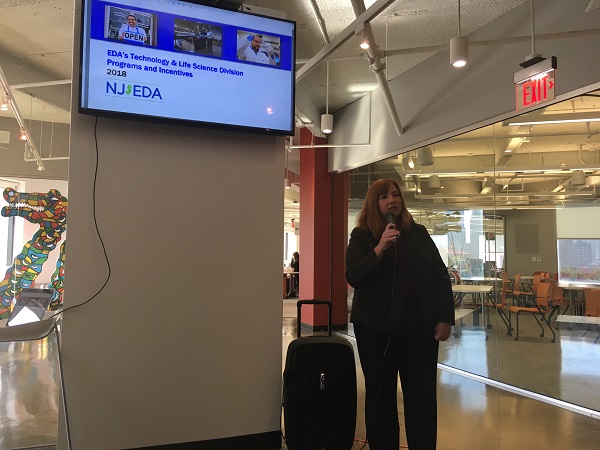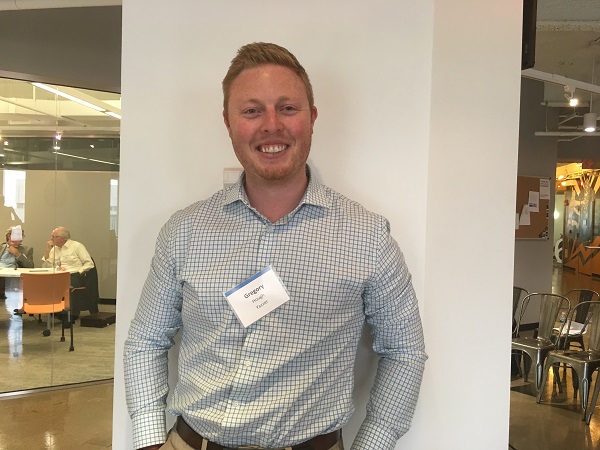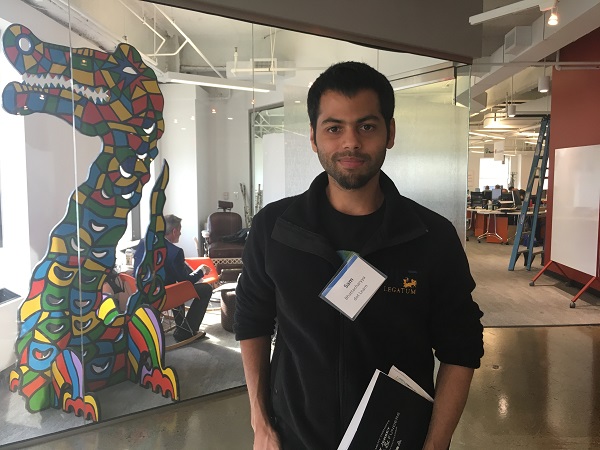After Encouragement from Murphy, Startups Meet Investors at November EDA Founders & Funders Event, Part 2
At the latest Founders & Funders event, which took place last week at Newark Venture Partners offices in Newark, startups were given the chance to connect with investors in one-on-one meetings. All of the startups had been pre-vetted by officials from the New Jersey Economic Development Authority, and then matched with appropriate investors.
Before the “speed dating” sessions, startups and investors alike received some words of encouragement and an overview of the New Jersey ecosystem from Governor Phil Murphy. Next, Kathleen Coviello, vice president, technology & life sciences investments at the EDA, went over the programs offered by the state that are designed to help invigorate the startup ecosystem. Gov. Murphy stayed for a while and many founders and investors took advantage of the opportunity to take photos with the governor.
NJTechWeekly.com was able to connect with a number of startups at the event. [See our first story on this topic here.] We asked them about their fledgling businesses and how their meetings with investors had gone.
Yazzer (Gregory Hough)
This Ewing Township startup is a mobile on-demand gasoline delivery service. “Our whole business model is through our mobile app,” said founder and CEO Gregory Hough. “It’s how you are going to order the gasoline and see where the delivery truck is. It also will issue your receipt and connect you with your loyalty programs. We’ll take the gasoline directly from our trucks to your car, so you never have to go to gas station again.”
Yazzer is targeting fleets to start. “We’ll service fleets with 50 vehicles or so, and we’ll go to their property and fill up all of their vehicles, so they don’t have to waste money on operational expenses.” Eventually, Yazzer will market its services to corporations, expecting the companies to offer the perk to their employees as a recruiting tool. “The last market we are going after are individual consumers, to save them time.”
Hough has domain expertise and a legal background. His family owns a gasoline distribution company. “It’s a family business since 1945. I know the industry very well, especially on the downstream side. I know this is the future of retail gasoline. It’s basically an industry that has not innovated or changed in, not just decades, but generations. We are trying to change this up.” Disrupting gas stations will be a good thing, he said, as they have a high incidence of crime and gasoline spills.
NJTechWeekly.com asked Hough about his meetings with investors. “We had a ton of smart feedback and we met a bunch of intelligent people. And because we are a pre-seed angel-backed company, the feedback is invaluable. I want to develop as many relationships as I can and get the word out about Yazzer. I had some great direction about next steps, and seeing Governor Murphy was pretty cool, too!” Hough said he didn’t know that the governor was going to be at the event until he got a “surprise email” that morning.
Inkbench (Steve Goodman)
Inkbench is an enterprise graphic-communications Software-as-a-Service (SaaS) platform that was developed within The SPI Group (Fairfield), the agency founded by CEO Steve Goodman in 1997.
“The SPI Group is a leading corporate reputation communications agency in New Jersey,” he told us. “We built a platform to support our own work with our clients, and it turned into something a little bigger. I’m here to evaluate the possibility of spinning it out of SPI.” Goodman noted he has been marketing Inkbench, and has customers using it.
He explained the problem he was solving as follows: “There is an explosion of content happening within large companies. So, there is more content, more channels, and an explosion of people supporting these channels. There is a need to manage this content in large companies.”
Currently, the “state of the art” is how it’s been done for years, he said. The source files are sent to numerous departments to be worked on, and “companies are losing control of the brand in this process.” The SPI Group is “marrying an enterprise digital management system with a canvass that contains all of the brand rules,” he continued. “End users within the company can create assets with the confidence that it’s brand compliant, without the need to work with an agency, and they have the ability to share those assets with others in the company,” so creatives are not starting from scratch.
NJTechWeekly.com spoke to Goodman after he had had five meetings with investors. He acknowledged that he was new to pitching for funding. “I think, with each meeting, I get a little bit better. I’ve been telling everyone I’m very good at running an agency and dealing with my enterprise clients; but, doing this, I feel completely out of my element.”
Some of the investors, he said, “really get what we are doing, and for other people it doesn’t resonate. … Everyone has given me good advice. This is a listening tour. I’m trying to get an idea of how it [Inkbench] will be received and how I can present it better.”
dot Learn (Sam Bhattacharyya)
dot Learn (Edison) is building a new video-compression technology business. “Our technology compresses videos by 50 times, while improving the video quality,” said cofounder and CEO Sam Bhattacharyya. “It works really well for computer-generated video, so you can imagine how this works for animations such as the Simpsons and for video games that are being streamed live.”
The customers for this product are video streaming services such as Amazon, said Bhattacharyya. The technology comes out of MIT. Bhattacharyya said that, as students, the international team working on this technology registered the business in the basement of his parent’s home, in Edison. Now they also have a workspace in New York and there is a team working out of India. Bhattacharyya said that he lives in Jersey City.
The founder said that the investors he had met with were receptive to his technology and ideas, and seemed to understand them. “I was surprised at how much the investors knew,” and also how well they understood the market. Some of the investors offered to connect him with their networks of people who had been working in video compression for years.







